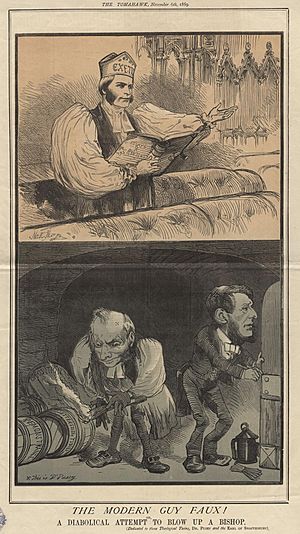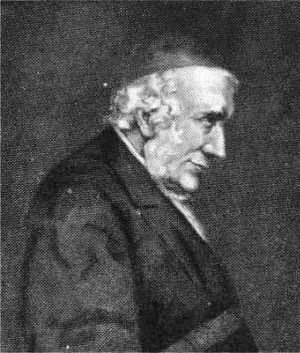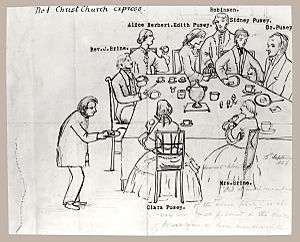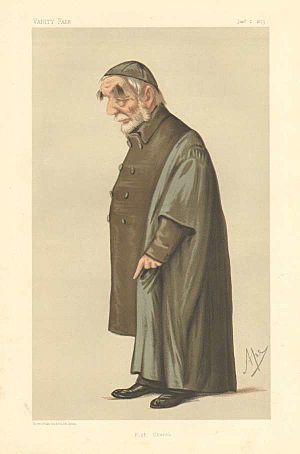Edward Bouverie Pusey facts for kids
Edward Bouverie Pusey (born August 22, 1800 – died September 16, 1882) was an important English Anglican cleric. For over 50 years, he was a professor of Hebrew at the University of Oxford. He was one of the main leaders of the Oxford Movement, a group that wanted to bring back older traditions to the Church of England.
Contents
Who was Edward Bouverie Pusey?
Edward Bouverie Pusey was born at Pusey House in a village called Pusey in Berkshire, England. This area is now part of Oxfordshire. His father, Philip Bouverie-Pusey, changed his last name to Pusey when he inherited the family estate. His mother, Lady Lucy Pusey, was the daughter of Robert Sherard, 4th Earl of Harborough.
Edward went to a special school for younger children in Mitcham. Later, he attended Eton College, a famous school. In 1819, he started studying at Christ Church, a college at Oxford University. He finished his studies in 1822 with top marks.
Becoming a Professor
In 1823, Pusey won a special competition to become a fellow at Oriel College, Oxford. Other important figures like John Henry Newman and John Keble were already fellows there.
From 1825 to 1827, Pusey traveled and studied. He learned about languages from the East and German religious ideas at the University of Göttingen in Germany.
In 1828, Pusey became a priest. Soon after, he got married. That same year, the Duke of Wellington, who was the Prime Minister, chose Pusey to be the professor of Hebrew at Oxford. This job also made him a leader at Christ Church college.
Leading the Oxford Movement

By the end of 1833, Pusey began to agree with the ideas of the Tracts for the Times. These were a series of writings that started the Oxford Movement. He wrote one of these tracts, about fasting, and signed it with his initials. This was unusual because the tracts were usually unsigned.
Pusey became more involved with the movement in 1835 and 1836. He wrote about baptism and helped start the Library of the Fathers, which translated old Christian writings.
When John Henry Newman left the Church of England to join the Roman Catholic Church around 1841, Pusey became the main leader of the Oxford Movement. People often called the movement Puseyism and its followers Puseyites.
Pusey's sermons at the university were very important. For example, his sermons in 1846 encouraged the practice of confession in the Church of England. His sermon in 1853 about The Presence of Christ in the Holy Eucharist changed how many Anglicans thought about worship.
Facing Challenges
Pusey spent a lot of time studying the writings of early Christian leaders and older English religious thinkers. In May 1843, he gave a sermon called The Holy Eucharist, a Comfort to the Penitent. Because of this sermon, he was not allowed to preach for two years. However, the sermon became very popular, selling 18,000 copies quickly.
In 1843, Pusey also helped Marian Hughes, who became the first Anglican woman since the Reformation to take religious vows. She later started a religious order in Oxford.
Pusey was often involved in arguments about religious ideas and university matters. He wrote many articles, letters, and sermons. He was part of debates about church laws, university changes, and marriage laws.
He helped bring back the idea of the Real Presence in the Eucharist. This led to more rituals in Anglican churches. Even though he didn't always agree with the ritualists, he often defended them when they were accused of breaking church rules.
Later Life and Impact
Pusey helped edit the Library of the Fathers, which translated works by early Christian leaders. One of the translators was Charles Dodgson, who was also known as "Lewis Carroll". Pusey became a friend and helper to Lewis Carroll. When Carroll's father was sad after his wife died, Pusey wrote him a comforting letter.
Pusey was not a powerful speaker, but people listened to him because he was so sincere. He had a big impact as a preacher and a spiritual guide, and he wrote many letters to people seeking his advice. In his private life, he lived very simply. He didn't have many close friends and rarely went to social events. While he could be tough on those who disagreed with him, he was kind to his friends and gave a lot to charity. He was known for his ability to work very carefully and in great detail.
From 1880, Pusey saw fewer people as his health declined. He passed away on September 16, 1882, after a short illness. He was buried in Oxford, in the cathedral where he had been a leader for 54 years. To honor him, his friends bought his library and a house in Oxford, now called Pusey House. This house was set up to continue Pusey's ideas at the university.
The Church of England remembers Edward Bouverie Pusey on September 16 each year.
His Writings
Pusey's first major work, published in 1828, was called An Historical Enquiry into the Probable Causes of the Rationalist Character Lately Predominant in the Theology of Germany. In this book, he responded to ideas about German theology. He also published a second part of this Historical Enquiry in 1830.
Some of Pusey's other important works include:
- Two books about the Eucharist, The Doctrine of the Real Presence (1855) and The Real Presence ... the Doctrine of the English Church (1857).
- Daniel the Prophet, which supported the traditional ideas about when the biblical book of Daniel was written.
- The Minor Prophets, with Commentary, which was his main work as a Hebrew professor.
- The Eirenicon, an effort to find common ground between the Church of England and the Roman Catholic Church.
- What is of Faith as to Everlasting Punishment: In Reply to Dr. Farrar's Challenge in His "Eternal Hope", 1879 (1881), which was part of a debate about everlasting punishment.
After his death, a book called Christus consolator (1883) was published. Pusey also translated many works as part of the Library of the Fathers series, including the Confessions by St. Augustine.
His Family
In 1828, Pusey married Maria Catherine Barker (1801–1839). They had one son and three daughters. His son, Philip Edward (1830–1880), edited a version of Saint Cyril of Alexandria's writings.
See also
 In Spanish: Edward Bouverie Pusey para niños
In Spanish: Edward Bouverie Pusey para niños
- Consubstantiation
- Friedrich Tholuck
- Frederick Field (who helped with the Bibliotheca Patrum)
 | DeHart Hubbard |
 | Wilma Rudolph |
 | Jesse Owens |
 | Jackie Joyner-Kersee |
 | Major Taylor |




